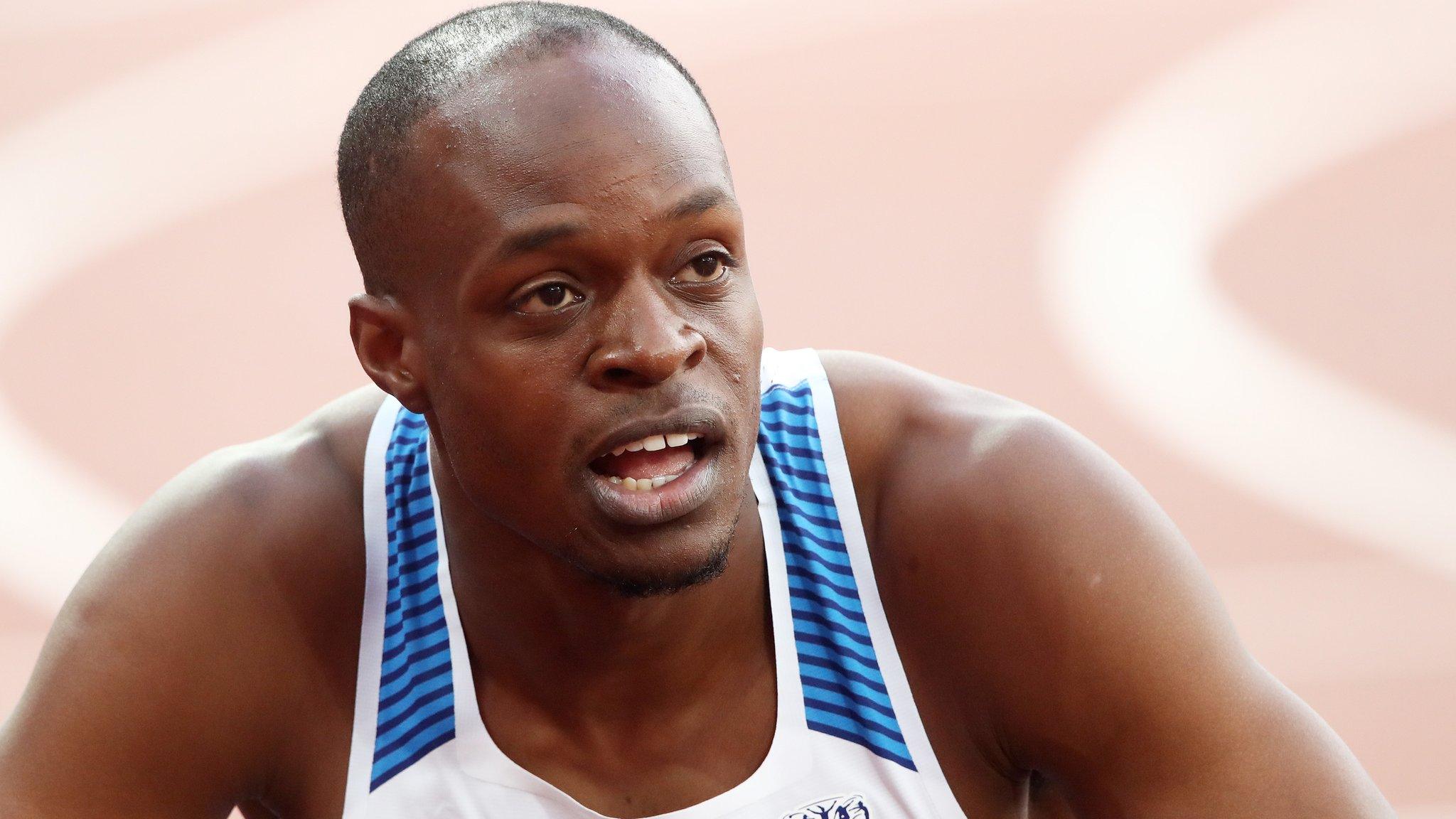Transgender women in sport: Are they really a 'threat' to female sport?
- Published
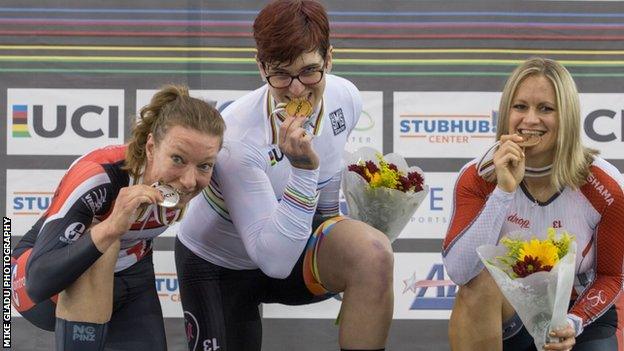
Rachel McKinnon (centre) pictured with Jen Wagner-Assali (right), who called her victory "unfair"
Rachel McKinnon estimates she has received more than 100,000 hate messages on Twitter since she won her UCI Masters Track World Championship title in October.
The 36-year-old Canadian's victory was controversial in some quarters because she is a transgender woman competing in female sport, albeit in the 35-44-year-old category.
Jen Wagner-Assali, who finished third, called it "unfair" and wants cycling's international governing body to change its rules.
Others have said further examples may "threaten" the participation of women in sport - a view described as "sensationalist" by transgender racing driver Charlie Martin, and as "transphobic" by McKinnon.
It is a sensitive topic, which poses some difficult questions about how gender is seen in sport, and some "dangerous" ones - according to transgender handball player Hannah Mouncey - about the fundamental right of athletes to participate in sport.
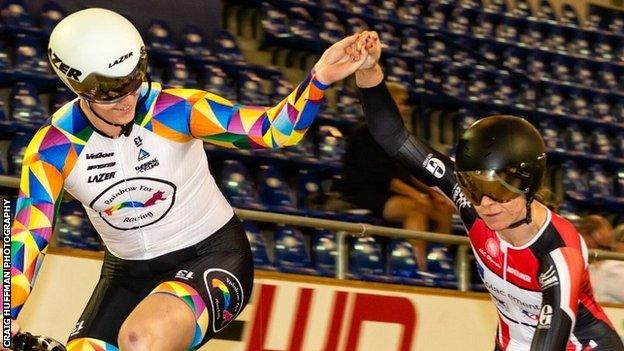
Rachel McKinnon says the majority of female cyclists have been supportive towards her, including Carolien van Herrikhuyzen
What's the issue?
Despite the hate messages, which McKinnon says outweigh positive ones by 3,000-1, and despite the harassment she received as a road cyclist before she switched to the track and the "painful" training prior to winning the world title, she says it was "totally worth it".
"When you win a cycling World Championship, you get to wear the rainbow jersey forever," she says.
But there are those who say McKinnon should never have been on the podium in California in the first place.
Critics say it is unfair to have a trans woman competing in female sport with a biologically male body, though McKinnon says that view goes against point four of the International Olympic Committee charter, which says: "The practice of sport is a human right."
The theory goes that because men can count on physiological advantages that on average make them bigger, faster and stronger, trans women will also benefit, making competition unfair.
Some also say male hormones such as testosterone being present in trans women's bodies since birth give them a boost.
Nicola Williams, of Fair Play for Women - a group established to represent women's voices "in the rush to reform transgender laws", believes trans women should not participate in female-only sport until more evidence is gathered.
But McKinnon, an assistant professor of philosophy at the College of Charleston in South Carolina and trans activist, believes much of the criticism is without foundation.
'The best decision I ever made' - being transgender in motorsport
How does the body change after transition?
Transgender women take the female hormone oestrogen and testosterone-blockers before having any surgery, and continue to take oestrogen after their transition.
McKinnon, who transitioned in her late-20s, says that results in "pretty radical physiological changes", with muscle mass, strength and speed all reduced. It also, claims McKinnon, "compounds ageing".
In essence, she maintains, it puts them on a similar level to women of the same size, and there are set limits to the amount of testosterone transgender athletes can have in their bodies before they compete. That is an issue currently being debated in women's athletics.
But McKinnon claims the same research being used as the basis for the decision on permissible testosterone levels in athletes also suggests naturally occurring testosterone makes a minimal difference to performance compared to when it is taken through doping, for example.
And McKinnon, who was a road cyclist before she switched to the track in 2017, says her power output was "dead centre average for women".
She also pointed out, after she won her world title in California, that Wagner-Assali had beaten her in 10 of 12 previous events.
What about the advantages of a bigger body?
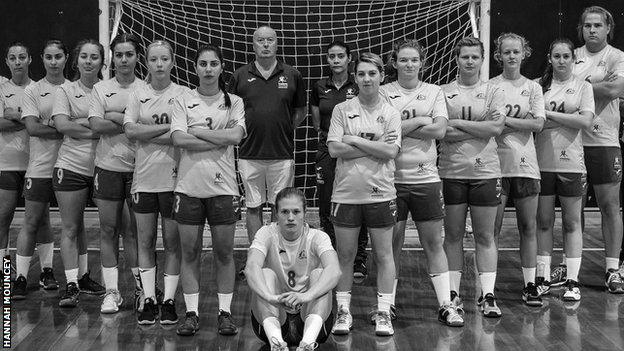
Hannah Mouncey (far right) with her Australian women's handball team-mates
It is not hard to pick out Hannah Mouncey in a picture of the Australian women's handball team. She is bigger and taller than the rest of the players.
Last year, Mouncey - the only transgender woman in the squad - was banned from being nominated for the women's Australian Rules draft because of the disparity in size between her and her opponents.
In response, she said:, external "Think about the message it sends to women and girls about their bodies: if you're too big, you can't play. That is incredibly dangerous and backward.
"Being heavy is not necessarily an advantage in a game that has such an emphasis on endurance and speed."
The 29-year-old has previously spoken about how female players "are quicker than me and have a better ability to recover because of my frame".
McKinnon argues there is "no such thing as a level playing field" anyway.
"People can say that cis gender [people whose gender matches that of their birth sex] men are 8-12% stronger than cis gender women, and I'm willing to accept that figure for the sake of argument.
"But we have to recognise that the average difference between men and women is far smaller than between the weakest and strongest woman, or the shortest and tallest woman.
"We permit very tall women to compete against short women in sports that select for tallness like basketball, volleyball or rowing, and we consider that fair. So we permit very large competitive advantages through natural characteristics.
"It also depends on the sport. For sports like cycling, where if you're going uphill you want to be as light as possible but as powerful as possible, someone with a larger skeleton is going to be carrying more weight, which is not helping them."
In some sports, such as boxing, weightlifting and judo, separate weight categories also exist, meaning athletes are cast against competitors of a similar size.
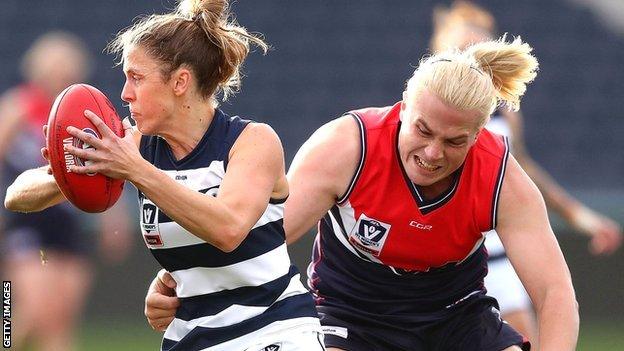
Hannah Mouncey (right) was banned from playing women's Australian Rules football, but now plays for Australia's handball team
How common are transgender women in female sport?
When BBC Woman's Hour tackled the subject this month, they spoke to Williams, who said trans women posed a "threat" to female participation in sport, at a time when they are already under-represented.
It is difficult to measure numbers accurately, but government figures suggest there are 200,000 to 500,000 transgender people in the UK, equating to 0.3%-0.75% of the population.
And the numbers taking part in sport will be affected by, in the words of Pride Sports, "the significant barriers that still exist, such as hostility to trans people and lack of trans policies from national and international governing bodies".
"It's never going to be the case that trans women are going to take over women's sport," says Martin. "That's a crazy and sensationalist argument to try and make an impact."
McKinnon says: "There is no evidence that participation drops among cis women when a trans woman is present so we should never set our policy based on people who are fearful of trans people. That is the definition of transphobia.
"Participation tends to improve when you make a sporting place more inclusive."
In a recent global survey, external of 1,000 women, 80% said trans women should have the same rights as them.
McKinnon says it is also worth considering that trans people have been able to compete in the Olympics since 2004.
"Not only is anyone yet to win a medal, but as far as we know, not a single trans person has gone to the Olympics," she said.
"In terms of Olympic sports, there have only been two world champions and I'm one of them."
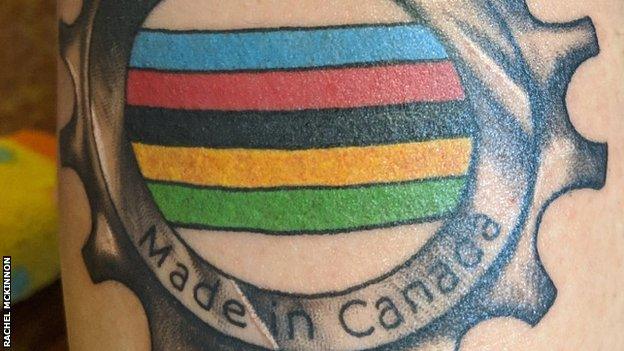
Rachel McKinnon got a special rainbow tattoo to mark her World Championship win
'Celebrate our achievements - don't revile us'
McKinnon says the scale of the reaction against her achievement took her by surprise.
"What people were saying wasn't surprising but the scale of the reaction was shocking," she says. "A lot of the negative reaction was from those who weren't really interested in women's sport but more a conduit for expressing their outrage at trans women.
"I received well over 100,000 hate messages on Twitter, physical hate mail at my job and hate via email too, so I had to change how I used social media in light of that harassment.
"I think my emotions afterwards were one of disappointment that we weren't further along than I hoped."
McKinnon says that, among the hundreds of supportive messages, the really meaningful ones are those from trans people, who have said her success has inspired them to get back into sport.
Both Martin and McKinnon say they were on the verge of quitting their sports after transition.
"Nobody should be denied the right to play sport," says Martin. "Sport has so many health benefits and it unites people and gives them a sense of well-being and connection from playing in a team.
"Walking away from sport is common in the trans community, so to try and make divisions like this is sad."
McKinnon adds: "People think this is a new topic, that there isn't decades of data that we are drawing upon. It's not. Trans people have been competing for decades, few of us make it to the highest level and even fewer of us ever win. So celebrate when we get there, don't revile.
"I'm immensely proud of what I've accomplished and I'm not done yet. The Masters championships are in England and I want to defend my title.
"And I want to try and make the Olympics, that dream isn't done. It's a long shot, maybe impossible, but I want to get to a place where we celebrate monumental achievements that haven't been done before."
- Published10 December 2018
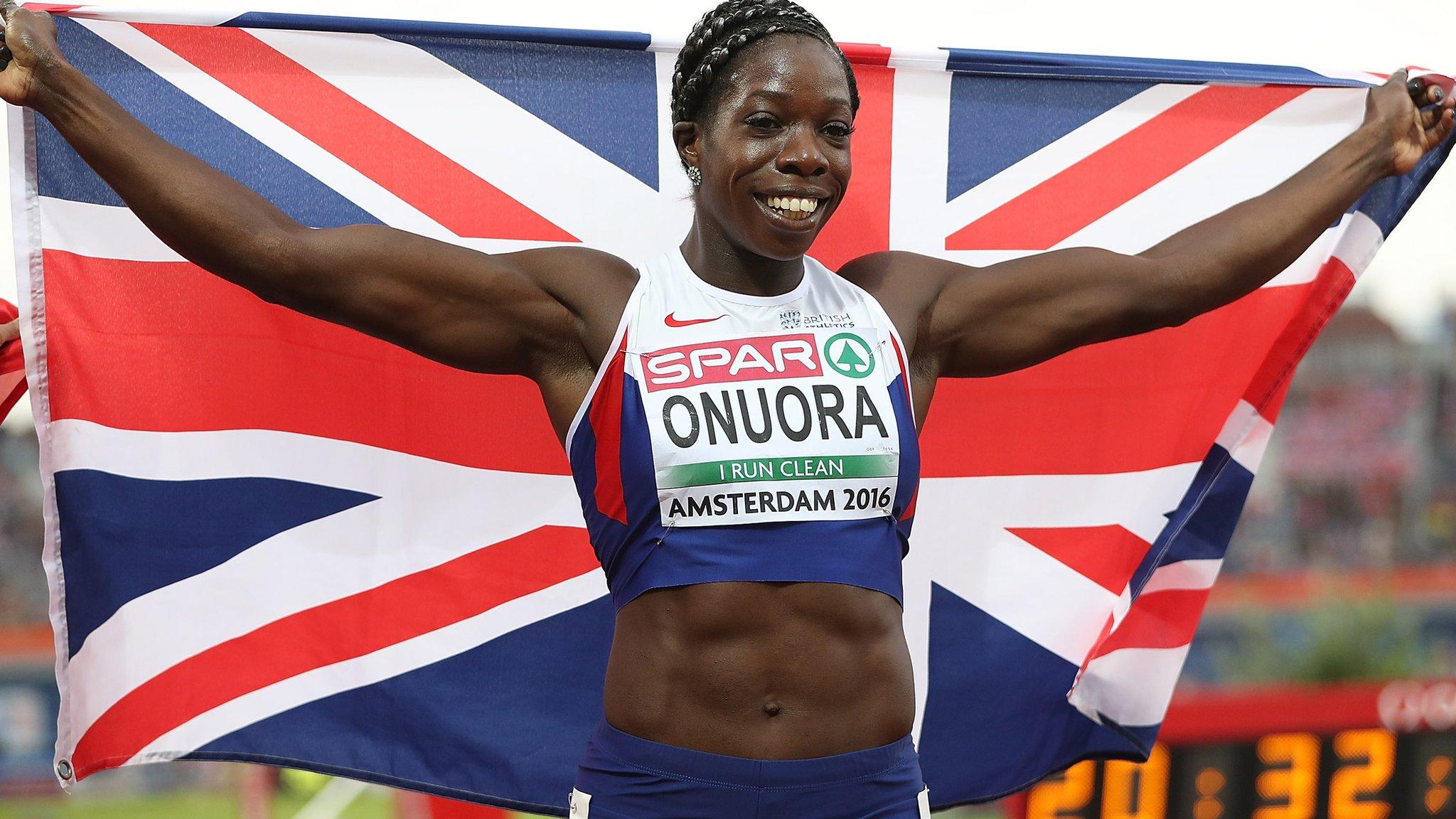
- Published17 December 2018
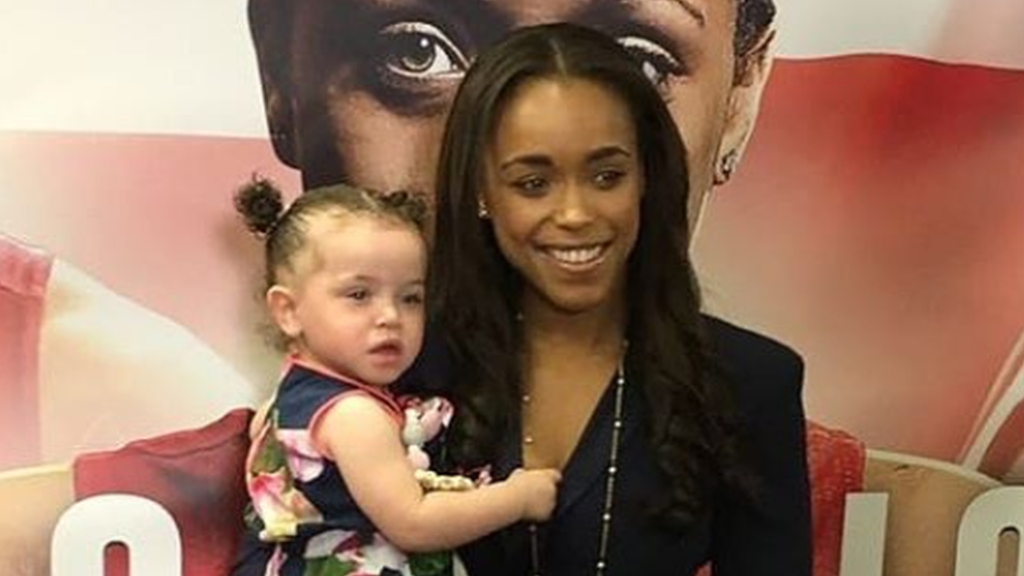
- Published9 December 2018
